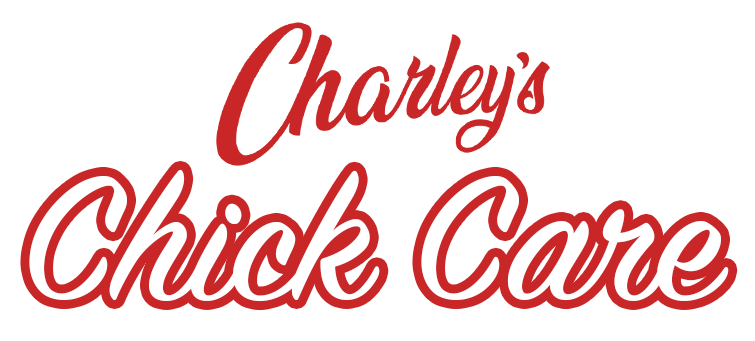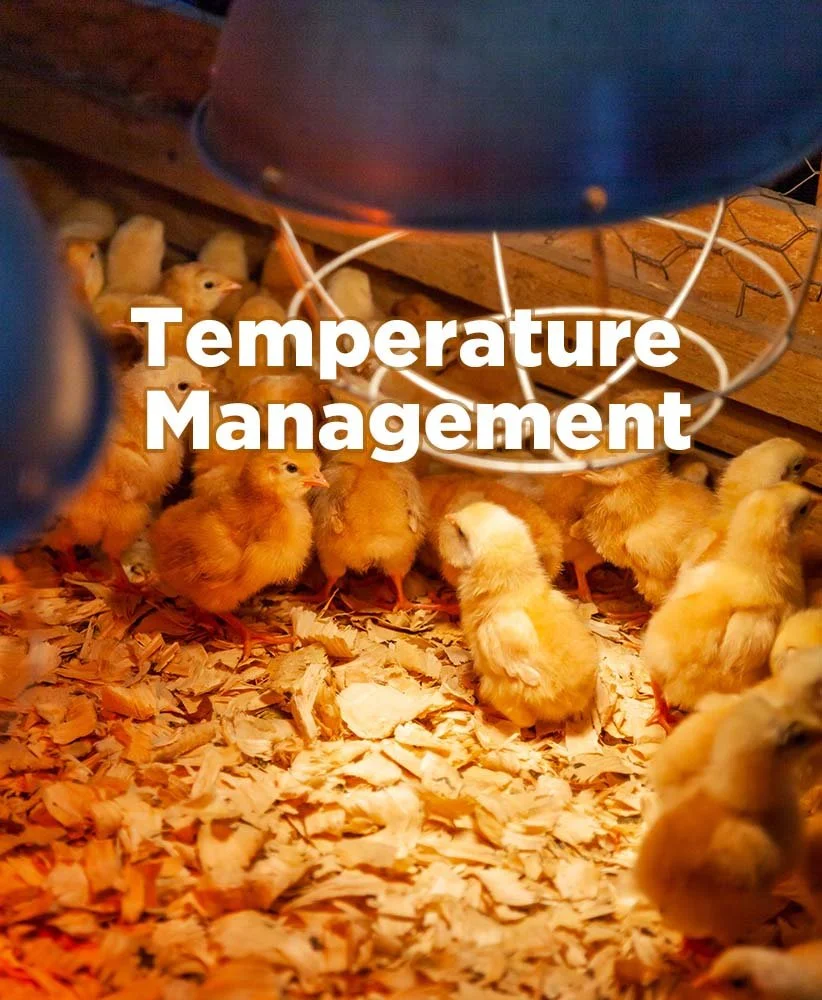Have you experienced a loss?
We are here to help. Click below for our 5 Day Guarantee
Tips for Raising Chicks
-
The brooder box is a controlled environment we set up and manage for growing chicks. Its here our efforts determine how our biddies will develop as the first few weeks are the most critical for chicks to reach their full potential as mature hens. What happens in the brooder stays with them for life. Establishing bio security for the safety and well being of your chicks is equally effective for you and your family. Be sure to wash hands before and after handling poultry.
A brooder box is any 4 sided bin, stock tank or pen that allows a safe place for chicks to eat, drink and grow. A variety of square or round bins can be used. A common practice is to place a cardboard brooder ring forming a circle inside the brooder box, 12” to 20” high, eliminating drafts and keeping easily distracted chicks near the feed, water and warmth. Prepare for 1/2 square foot per chick as a standard for space to develop healthy flock “social” skills.
Covering the floor of the box with bedding is a great way to minimize chicks feet from slipping, absorb excess moisture from droppings and provides a clean, pathogen-free environment for your chicks. There are many options to choose from when selecting the right bedding. For our climate in North Florida we recommend using pine shavings or rice hulls.
As incubated baby chicks have little to no immune system at this age, keeping chicks inside the brooder box and indoors for these first few weeks of life is a great way to help them build a robust immune system before being introduced to the outdoors. They will spend the greater part of their life in the backyard and in order to reduce exposure to particular bacteria they are not prepared for, we recommend to leave baby chicks in the brooder permanently until 4 weeks of age.
-
Perhaps the most important step…
Temperature management is critical for the health and wellbeing of baby chicks. From the moment they hatch, chicks are highly sensitive to temperature fluctuations, which can affect their growth, development, and overall survival rate. The ideal temperature for newly hatched chicks is between 90°F to 95°F for the first week of life. Maintaining this temperature is essential as it helps chicks to regulate their body heat, ensuring that they do not become too cold or too hot.
When chicks are too cold, they are unable to maintain their body temperature. This can lead to a variety of health issues, including increased susceptibility to disease, lethargy, and poor growth. Cold chicks often huddle together to share warmth, but if the ambient temperature remains low, they can suffer from hypothermia. Signs of a chick being too cold include excessive fluffing of feathers, peeping loudly, and lethargic behavior. If not addressed quickly, hypothermia can lead to death.
Also, overheating can be just as detrimental. When chicks are exposed to excessively high temperatures, they can become stressed, leading to dehydration and heat exhaustion. Symptoms of heat stress in chicks include panting, spreading their wings away from their bodies, and seeking out cooler places. If they are not provided relief from the heat, it can result in detrimental effects on their health, including mortality.
Temperature management requires careful monitoring and adjustment of the environment in which the chicks are raised. This is why we always recommend that baby chicks be kept INSIDE THE HOME where drywall insulation and central heat and air offer the perfect consistant environment for baby chicks to thrive. Heat lamps or brooder systems can help maintain the desired warmth in the brooding area. The proximity of the heat source should be adjusted as chicks grow and their self regulating capabilities develop. As they transition from the first week to following weeks, the temperature can be gradually decreased by about 5°F each week until they reach a stable environment of around 70°F
Ultimately, the correct temperature management of baby chicks is vital for their growth and development. It influences not only their immediate survival but also their long-term productivity as they mature into adult birds.
-
Air circulation is also crucial for the overall well-being of baby chicks. Proper ventilation in their environment plays a significant role in maintaining a stable temperature and humidity level. Baby chicks are particularly sensitive to their surroundings; they require warmth but can easily overheat if there is inadequate airflow.
Good air circulation helps to disperse harmful gases, such as ammonia, which can accumulate from droppings. High levels of ammonia can irritate the respiratory systems of chicks, leading to health issues. Fresh air not only dilutes these gases but also brings in oxygen necessary for their growth and vitality.
Plus, effective air movement prevents the buildup of excess moisture, which can create a damp environment susceptible to the growth of pathogens. Keeping the bedding dry and maintaining a clean living space promotes a healthier habitat for the chicks.
Another reason why chicks placed INSIDE THE HOME is optimal for their overall health. Allowing central heat and air to manage humidity and consistent air movement for the chicks while in the brooder.
-
Fresh feed is essential for baby chicks as it directly impacts their growth, health, and overall development. Young chicks require specific nutrients, including proteins, vitamins, and minerals, to support their rapid growth and immune system. Fresh feed helps ensure that they receive these vital nutrients in the proper amounts.
Stale or contaminated feed can lead to health issues, such as digestive problems or even disease. Additionally, fresh feed promotes better digestive health, as chicks are more likely to consume it enthusiastically, leading to improved feed conversion rates.
It is also important to provide feed that is specifically formulated for chicks, containing the right balance of nutrients needed during this critical stage of life. Factors such as cleanliness and proper storage should be considered to maintain feed quality. Overall, providing fresh feed is a fundamental aspect of responsible chick care that lays the foundation for healthy, thriving birds.
-
Clean water is essential for the health and growth of baby chicks. As they develop, their bodies require ample hydration to support various physiological processes, including digestion, temperature regulation, and overall metabolism.Chicks can become dehydrated quickly, especially in their early days, leading to stress and impaired growth. Access to clean, fresh water helps prevent dehydration and supports their immune system, protecting them from disease. Contaminated water can introduce harmful bacteria and pathogens that can cause illness, so it's crucial to ensure that their drinking water is changed regularly and kept free from contaminants.
In addition to hydration, clean water aids in the proper digestion of feed. Chickens, including baby chicks, rely on water to help break down their food, facilitating nutrient absorption. Providing a reliable source of clean water fosters healthy development and contributes to the overall well-being of the chicks, setting the foundation for a productive life as they mature.
-
Biosecurity refers to the specific practices and measures that are diligently taken to prevent the introduction and spread of diseases among various poultry. Given the close proximity in which many backyard flocks typically exist, even a small oversight in these biosecurity practices can unfortunately lead to significant health issues for the birds, potentially compromising their wellbeing and productivity. It is, therefore, crucial for chicken owners to remain vigilant and proactive in implementing these important measures. Implementing strong biosecurity measures involves several key strategies:Hygiene: Always wash your hands thoroughly with soap and water before and after handling your chickens. Chickens should not be snuggled, kissed or come into contact with your face.
Visitor Management: Limiting access to your chicken coop is highly recommended. Visitors should wear clean footwear or boot covers, and it is wise to restrict non-essential visitors.
Flock Health Monitoring: Regularly observing your chickens for any signs of illness can help catch issues early.
Disinfect: Thoroughly clean and disinfect all equipment used to care for chicks and adult chickens. This includes feeders, drinkers and any other equipment used.







